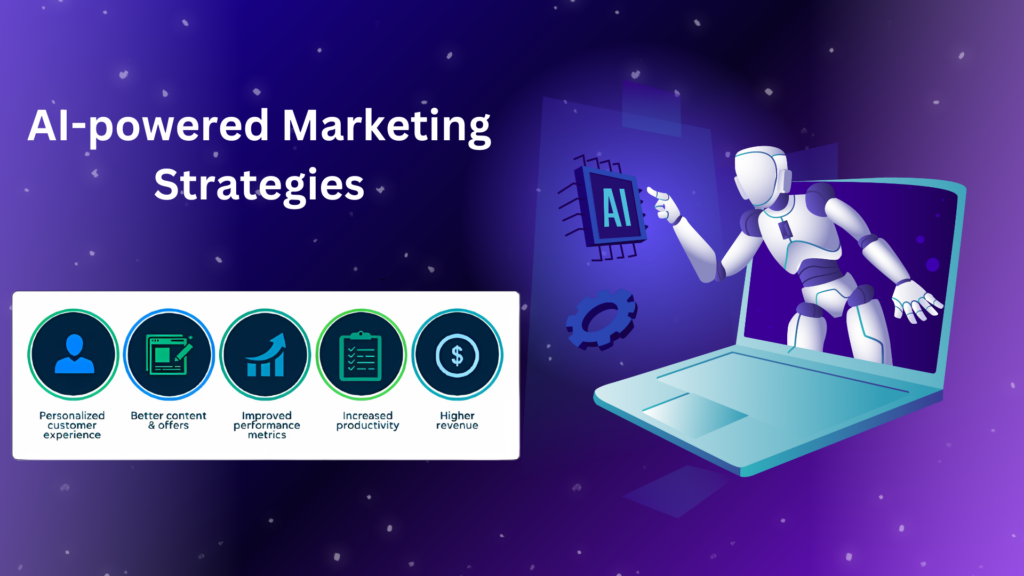Table of Contents
Toggle
AI-powered marketing strategies are transforming business-consumer connections through predictive analytics, personalization, and automation. These strategies enable data-driven decisions, optimizing campaigns and enhancing marketing efficiency. By leveraging AI, businesses can personalize content, predict customer behavior, and automate tasks, leading to improved ROI and stronger customer relationships.
Predictive Analytics in AI-Powered Marketing
Predictive analytics leverages historical data, machine learning algorithms, and statistical techniques to forecast future trends, customer behavior, and market demands. By predicting how customers are likely to behave, businesses can craft proactive marketing campaigns that are more targeted and effective.
- Definition & Methodology: Predictive analytics involves analyzing vast amounts of data from customer interactions, past purchase behaviors, social media activity, and website visits. Machine learning models then interpret these data sets to predict customer actions, such as product purchases or engagement rates.
- Benefits: By predicting customer needs, businesses can significantly reduce wasted marketing spend, increase conversion rates, and optimize customer engagement. Additionally, businesses can tailor content and offers to meet the anticipated demands of different customer segments.
- Applications: Predictive analytics is especially valuable in e-commerce, where businesses forecast shopping trends, in healthcare, where it helps predict patient outcomes, and in finance, where it anticipates market shifts.
- Industry Relevance: This technology is particularly useful in high-velocity sectors like retail, finance, and online services, where staying ahead of trends can be the key to a competitive advantage.
Personalization through AI in Marketing
Personalization powered by AI enables businesses to deliver tailored content, recommendations, and promotions to customers, making interactions feel more relevant and engaging.
- Definition & Methodology: AI algorithms analyze customer data—such as past purchases, browsing history, and preferences—to create individual profiles. These insights enable brands to customize marketing messages, product recommendations, and promotions that resonate with specific customers.
- Benefits: The result is a more personalized customer experience that increases engagement, enhances customer loyalty, and improves the likelihood of repeat purchases. AI-driven personalization also enhances marketing efficiency by ensuring that content reaches the right person at the right time.
- Applications: Retailers like Amazon use personalization to suggest products based on customer browsing behavior. Streaming platforms such as Netflix leverage AI to recommend shows and movies based on viewing history.
- Challenges & Opportunities: One challenge in personalization is ensuring data privacy and avoiding intrusive marketing practices. However, with transparent data usage policies and respect for customer preferences, AI personalization presents an opportunity for deeper customer relationships and long-term loyalty.
Data-Driven Decisions and Automation in Marketing
AI-powered marketing strategies help businesses make smarter, data-driven decisions by automating repetitive tasks and optimizing campaigns in real-time.
- Definition & Methodology: Data-driven decision-making involves using real-time data to guide marketing strategies, while automation refers to the use of AI tools to execute tasks such as email marketing, ad placements, and social media updates. These AI systems continuously monitor performance and adjust strategies without manual intervention.
- Benefits: Automation reduces human error, increases campaign efficiency, and frees up marketing teams to focus on strategy and creativity. Data-driven decisions ensure that campaigns are grounded in insights, resulting in higher ROI.
- Applications: Email marketing platforms like Mailchimp use AI to segment audiences and schedule emails, while Google Ads employs AI to optimize ad placements based on user behavior patterns.
- Industry Relevance: Automation and data-driven decisions are essential in industries like real estate, fintech, and travel, where timing and targeting precision can dramatically affect business outcomes.
Marketing Efficiency Through AI-Powered Campaigns
AI improves marketing efficiency by streamlining workflows, enhancing targeting capabilities, and offering real-time insights into campaign performance.
- Definition & Methodology: AI tools automate the collection and analysis of data, helping businesses optimize budget allocation, targeting strategies, and creative decisions. AI can also help predict which marketing channels will yield the highest returns.
- Benefits: The main benefit of AI-powered marketing is the ability to scale campaigns while maintaining high levels of precision and effectiveness. By leveraging AI, businesses can reach larger audiences without sacrificing personalization.
- Applications: In social media marketing, AI algorithms can analyze user behavior and optimize post timing, content type, and audience targeting, ensuring campaigns are as efficient as possible.
- Challenges & Opportunities: While AI-powered efficiency promises substantial cost savings, businesses must ensure that their AI systems are correctly calibrated to avoid over-automation, which could lead to generic messaging or missed opportunities for creative innovation.
Industry Applications and Future Trends in AI-Powered Marketing
AI-powered marketing strategies are applicable across industries, and as technology evolves, new possibilities continue to emerge.
- E-Commerce & Retail: AI-powered chatbots, personalized recommendations, and dynamic pricing models are revolutionizing how online businesses engage with customers.
- Healthcare: AI-driven content personalization is helping healthcare providers communicate more effectively with patients, while predictive analytics enhances patient outcomes by forecasting medical conditions.
- Finance: AI enables financial institutions to deliver tailored investment recommendations, while automated systems detect fraud and analyze market trends in real-time.
- Future Trends: The future of AI-powered marketing looks promising, with advancements in natural language processing (NLP) allowing for even more sophisticated interactions between businesses and customers. The rise of AI-powered personalization and deeper insights into consumer behavior will continue to shape the future of marketing.
Conclusion
AI-powered marketing strategies are reshaping the way businesses approach customer engagement, from predictive analytics to automated content personalization. As businesses adopt these data-driven techniques, they stand to gain increased efficiency, improved ROI, and more meaningful customer relationships.
